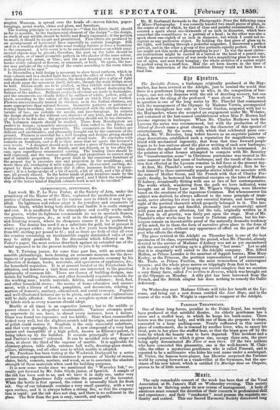(Or Otatrts.
The Invisible Prince, a burlesque originally produced at the Hay- market, has been revived at the Adelphi, just to remind the world that there is a gentleman living among us who, in the composition of bur- lesque, can not only dispense with the aid of dazzling scenery, but can even eschew the slang of the professed "man about town." The work in question is one of the long series by Mr. Planche that commenced with the management of the Olympic by Madame Vestris, accompanied that lady throughout her rule at Covent Garden, migrated with her to the Haymarket, where she accepted an engagement under Mr. Webster, and remained at the last-named establishment when Miss P. Horton had become supreme in burlesque. When Mr. Charles Mathews took the Lyceum the series was recommenced, but with the production of the Island of Jewels came a great change in the character of this species of entertainment. By the scene, with which that celebrated piece eon- eluded, Mr. W. Beverley, long before known as an exquisite painter of stage decorations, established such a reputation for magnificence, com- bined with mechanical ingenuity, that from that time forward people began to be less curious about the plot or writing of each new burlesque, than about the splendour of the picture, with which it terminated. As the painters at other houses attempted to compete with Mr. Beverley the "transformation scene" in Christmas pantomime was treated in the same manner as the last scene of burlesque, and the result of the revolu- tion first effected at the Lyceum remains in ftill force at the present day. At first, Mr. Planche's series was purely mythological; then he be- took himself to those universally popular stories which we associate with the name of Mother Goose and the French with that of Charles Per- rault; finally, he bestowed 'his theatrical energies on the tales of Madame D'Aulnoy, occasionally flirting with one or two of her contemporaries. The works which, wandering from the path we have indicated, were brought out at Drury Lane and Mr. Wigan's Olympic, were likewise based on the creations of the ingenious Countess. But whencesoever his subject was derived, he always adhered to the same principle of treat- ment, never altering his story in any essential feature, and never losing sight of the poetical character which properly belonged to it. The lan- guage was grotesque and fanciful, pleasantly (not excessively) spiced with puns and modern allusions, but the tale, originally written as it had been in all gravity, was fairly put upon the stage. Most of Mr. Planehe's other works may be traced to Parisian authors, but his bur- lesques remain an incontestible proof of the naturally dramatic tendency of his mind, for in them the form of narrative gives place to the form of dialogue and action without any appearance of effort on the part of the poet who effects the change. The piece revived at the Adelphi on Thursday last is one of the best specimens of its class, representing the period, when Mr. Planche, already devoted to the service of Madame d'Aulnoy was not as yet encumbered with the necessity of writing up to a glittering "last scene." Let us add that it is singularly well suited to the Adelphi company. Mrs. Alfred Mellon, as Prince Leander is the smartest of foppish heroes • Miss Mary Keeley, as the Princess, the prettiest representation of pert innocence; Mr. Toole, as Prince Fnribon, the most tremendous of extravagant tyrants ; and the whole piece moves on trippingly from first to last. It is only for the sake of keeping our record complete that we mention a very flimsy farce, called rye written to Browne, which was brought out at the Olympic on Monday. A silly plot has been borrowed from the French, and the British adapter has done nothing to remedy the Gallic deficiency.


































 Previous page
Previous page